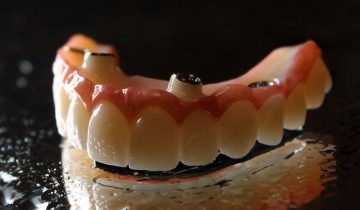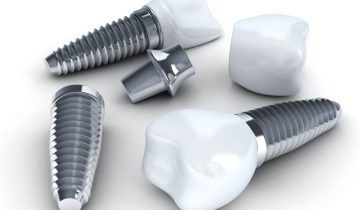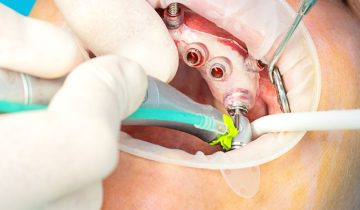Last updated on October 18th, 2023
Implant-supported dentures, also called implant dentures, are an effective dental treatment to replace missing teeth in the upper or lower jaw. As the name suggests, dentures are anchored to the jawbone through dental implants. There are 4 types of implant-supported dentures. They are implant-supported fixed dentures, implant-supported removable partial dentures, implant-supported upper dentures,s, and implant-supported overdenture.
In this post, you will learn about implant-supported dentures, who benefit most from this treatment, what the procedure is like (implant, dentures, etc.), the pros and cons of the treatment, and how to care for the dental fixtures after treatment. At the end of the article, there is a FAQ section where you can find the most critical questions and brief answers to them.
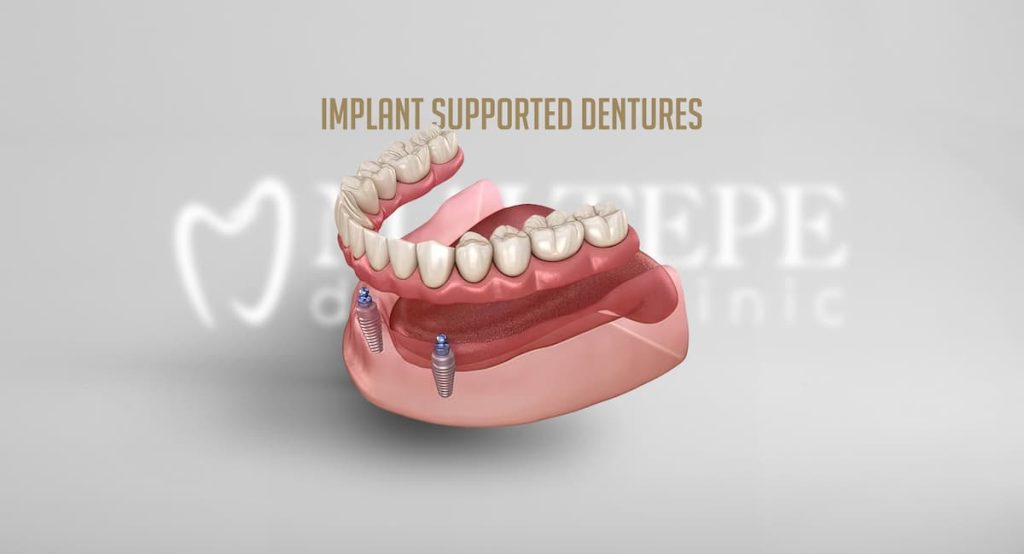
What Are The Different Types Of Implant-Supported Dentures?
Here are 4 different types of denture implants:
- Implant-supported Fixed Dentures
- Implant-supported Removable Partial Denture
- Implant-supported Upper Denture
- Implant-Supported Overdenture
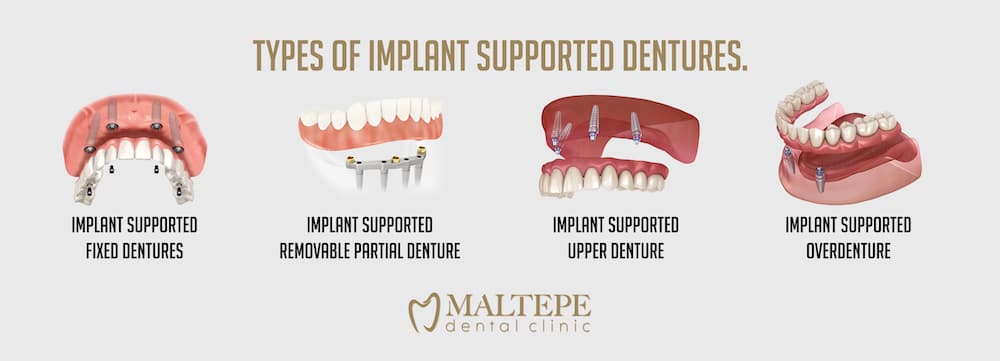
Implant-supported Fixed Dentures
Implant-supported fixed dentures are a type of denture that is permanently attached to the jaw bone along with prosthetic gum tissue. Fixed-implant-supported dentures are secure and comfortable. According to a study published in Clinical Implant Dentistry And Related Research in 2020, Implant-supported fixed partial dentures (ISFPDs) have a 72.7% estimated survival rate at 30 years.
Implant-supported Removable Partial Denture
Implant-supported removable partial dentures (ISRPDs) are similar to fixed dentures, except they partially replace the teeth and are removable. They are also more cost-effective and require less bone structure to support the dentures. However, patients are required to remove and clean the dentures every night.
Implant-supported Upper Denture
Implant-supported upper dentures are a relatively new solution for missing teeth in which dentists use two to four dental implants to keep the denture stable on the upper jaw. It is a very comfortable and functional treatment, but lower teeth usually require more careful adjustments.
Implant-Supported Overdenture
Overdentures can be supported by the remaining natural teeth or implants. Implant-supported overdentures, as the name suggests, are supported by implant posts, and they are snapped on the implants using clips or bars. Patients can remove and rinse implant overdentures for overnight cleaning.
Who Needs Implant-Supported Dentures?
Patients missing several or all of the teeth in their mouth might need implant-supported dentures. However, a healthy bone structure is required to fix implant posts. Therefore, some patients might need to have a dental bone graft treatment before getting implants.
What Is The Process For Placing Implant-Supported Dentures?
The process for placing implant-supported dentures is as follows:
Initial Consultation
In the initial consultation, the dentist checks the current condition of your teeth and jawbone. Your nerves and sinus cavities are located at this time. You and your dentist will then discuss the treatment in detail such as whether you need bone grafting therapy or not.
Initial Surgery
If you need to have a bone graft, the dentist performs this treatment first. Then, the dentist might extract the decayed or damaged teeth to facilitate the implant treatment. They also prepare a temporary denture designed for you.
Implant Placement
Your dentist (usually an oral surgeon or a periodontist) places the implants in your jawbone. Then, you need to wait for 3-6 months for the implants to fuse with the bone structure. Meanwhile, you will wear a temporary denture. For more information, you may read “Dental Implant Procedure“.
Taking Impressions
When the implants are fused and the gum tissue is healed, your dentist takes impressions of your upper or lower arches. The impressions are sent to the laboratory, and technicians begin crafting your permanent dentures.
Denture Placement
Once the denture is ready, your dentist places it in your mouth. Then, they inform you about the best oral hygiene, denture cleaning, and maintenance required for upkeep.
What Are The Pros Of Implant Supported Dentures?
Some of the most significant advantages of implant-supported dentures are:
- Increased Stability And Retention: Implant dentures don’t slip or come out like traditional dentures.
- Improved Chewing Ability: Implant dentures improve the functionality of your teeth, especially in terms of chewing.
- Increased Comfort: Implant-supported dentures don’t cause any discomfort while you are eating or speaking.
- Longer Lifespan: Implant-supported dentures last considerably longer than traditional dentures.
What Are The Cons Of Implant-Supported Dentures?
The cons of implant-supported dentures are:
- Infection
- Bleeding
- Pain
- Nerve Damage
- Sinus Damage
For a comprehensive discussion on potential complications and failures, including those mentioned above, you may want to read “All You Need to Know About Dental Implant Complications and Failures“.
How Do I Care For Implant Supported Dentures?
According to an article published in Clinical Oral Implants Research in 2007, implant dentures have low technical complication rates. However, you should still follow these maintenance routines to get the most benefit out of your implant-supported dentures.
For implant-supported removable dentures:
- Clean them twice a day.
- Keep them in a denture solution overnight.
For implant-supported fixed dentures:
- Brush your dentures using a soft-bristled toothbrush.
- Brush and floss your teeth around the implants thoroughly.
For either type of implant dentures, never skip your regular dentist appointments.
Before And After Images Of Implant-Supported Dentures
Here are the before and after of implant-supported dentures:
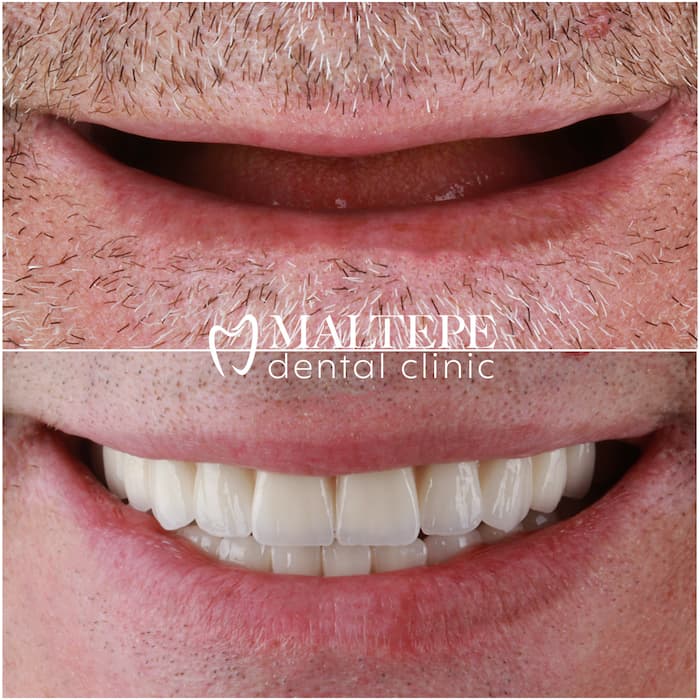
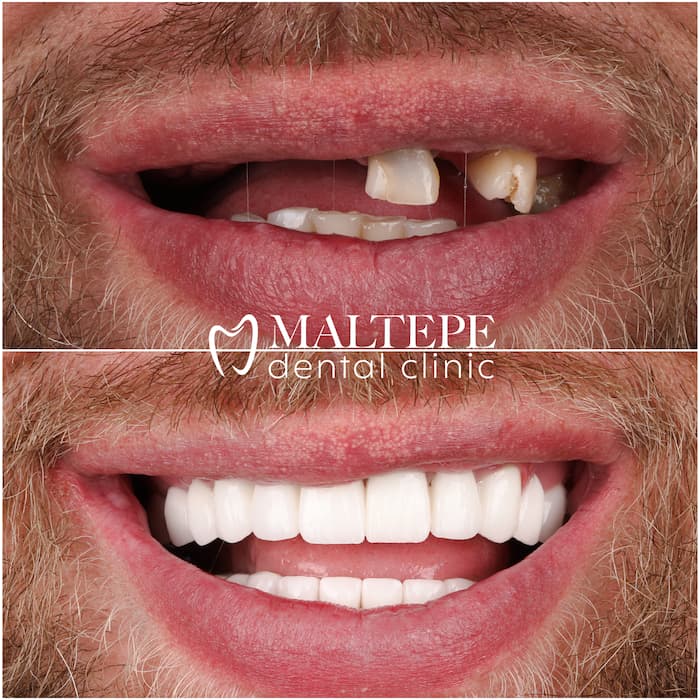
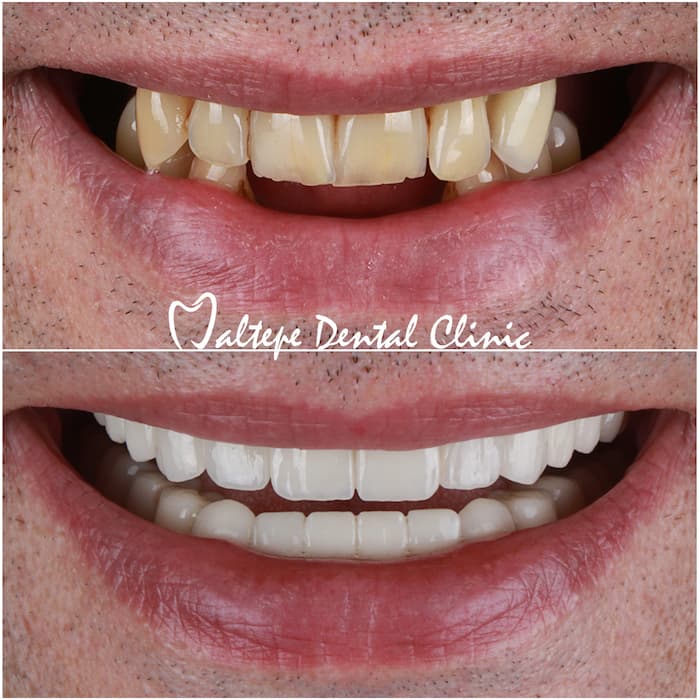
FAQs About Implant-Supported Dentures
Here you can find the most frequently asked questions about implant-supported dentures:
How Long Do Implant-Supported Dentures Last?
Implant-supported dentures can last up to 30 years.
Can You Get Dental Implants Years After Dentures?
Yes, you can. It is always possible for a patient to switch from traditional dentures to implants.
Are Implant Supported Dentures Permanent?
They can be permanent or removable depending on your needs and expectations.
What are the Different Types of Dentures?
There are different types of dentures that dental professionals use in treatments such as full denture, partial denture, immediate (or temporary) denture, overdenture, etc.
How Many Implants Do I Need For Implant-Supported Dentures?
They might use 2, 4, or 6 implants to support dentures depending on the case.
How Much Do Implant Supported Dentures Cost?
The cost of implant-supported dentures falls somewhere between $5000 and $25000 per arch depending on the types of treatments you get during the process.
Are Implant Supported Dentures Covered By Insurance?
Dental insurance usually pays part of the implant denture cost.
What Is the Alternative To Denture Implant?
Dental bridges are an alternative to denture implants. Dental bridges can be a less expensive and less invasive alternative to implant dentures.
Are Implant-Supported Dentures Better Than Bridges?
If you are only missing a few teeth, bridges are possibly a better option. If you are missing all or most of your teeth, then implant-supported dentures are better suited for you. For more information, you may read “Which One Is Better Dental Implant or Bridge?”
What Is The Difference Between All-On-4 And Implant-Supported Dentures?
All-on-4 dental implants are fixed on the gum line without interfering with the roof of the mouth, in order to allow patients to taste and speak better when compared to implant-supported dentures. On the other hand, All-On-4 implants are usually more expensive.
What Is The Best Material For Supported Dentures?
The best material for implant-supported dentures is zirconia due to its strength and lower risk of adverse reaction.

